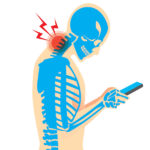Believe it or not good posture is not only important for aesthetics and how we look to others, it is vital to the function and maintenance of every part of your body, from your muscles and your joints all the way to the health of your organs and your longevity!
Identifying a postural distortion (and having a plan to correct it) as soon as possible is one of the fastest ways to avoid long-term damage, quickly boost energy, and safeguard your health over your lifetime.
Look around. See any good posture? You won’t need to look far to see people of all ages and even fitness levels with deteriorating posture.
With more video games, smart devices and increased time sitting in desks, driving in cars and being generally inactive…we’re not helping ourselves to solve these issues.
Good posture is becoming something of the past.
Experts are beginning to consider postural deviations and the health problems associated with them epidemic.
DID YOU KNOW THAT POOR POSTURE CAN:
- Accelerate depression, stress and consume energy. In a study with university students, walking in a slouched position decreased energy levels and increased feelings of depression. A structural distortion puts your body in a state of increased energy consumption…in fact Roger Sperry PhD. won the Nobel Prize for stating “the more mechanically distorted a person is, the less energy is available for thinking, metabolism and healing.”
- Add a few pounds and contribute to digestive disorders. Chronic slouching positions can constrict your intestines making digestion difficult. This also causes increased pressure on the abdominal wall, protrudes the belly and can make one look heavier than they are.
- Increase musculoskeletal pain. It only makes sense that the harder your muscles must to work to support your distorted body, the more fatigued, inflamed and uncomfortable they will become. How many people with headaches, back pain, shoulder pain or other related conditions are simply experiencing the secondary effects of poor posture.
- Restrict breathing. More than one study has demonstrated that moving the head into a forward direction can reduce lung function. Constricting the lungs’ expansion and contraction also diminishes the amount of oxygen getting to the rest of body.
- Contribute to a shortened lifespan. It’s hard to say whether this is a “chicken or egg” situation but multiple studies show that (at least in the aging population that was studied) a forward head position (hyperkyphosis) relates to increased mortality. Yes. You read that correctly. Poor posture can increase your chance of dying.
WHY IS GOOD POSTURE IMPORTANT?
The main reason poor posture is detrimental to the function of the human body is because it can be a sign of a CORE PROBLEM.
A CORE PROBLEM is a problem with one of the body’s central requirements for health.
Poor nutrition, a sleep deficiency, or lackluster exercise habits would all be classified as CORE PROBLEMS. In each situation, leaving this problem unaddressed could lead to COLLATERAL DAMAGE.
To give a non-health related example…
If the foundation of your home had a shift that was left unaddressed, over time it could develop into a host of other conditions like damaged drywall, tilted door frames and with enough time that CORE PROBLEM could begin to cause more serious issues like electrical or plumbing damage.
TRY THESE 3 DIY TESTS TO IDENTIFY POSSIBLE POSTURE PROBLEMS:
While a comprehensive Neuro-Structural Examination is the most accurate way to identify and confirm structural distortion and quantify it’s impact on health and performance outcomes, these three quick tests will give you a basic idea if further examination is warranted.
1. THE MIRROR TEST
Stand facing a full-length mirror and look to determine if:
- Shoulders are level
- Head is straight
- Spaces between your arms and sides are equal
- Your hips are level and your kneecaps face straight ahead
- Ankles are straight.
Stand parallel to the mirror and take a photo or have someone else look to determine if:
- Head is erect and not shifted forward or backwards
- Chin is parallel to the floor and not tilting up or down
- Shoulders are in line with your ears and not drooping forward or pulled back
- Stomach is flat
- Knees are straight
- Lower back has a slight forward curve
2. THE WALL TEST
Stand with the back of your head, shoulders and buttocks touching the wall and your heels six inches from the baseboard.
- Check the distance with your hand between your neck and the wall
- If your head, shoulders or buttocks cannot touch the wall or if you can slide more than three fingers behind your neck, you may have a postural distortion and there’s a likelihood it is affecting your health in some capacity
3. THE FLOOR ANGEL
Lie on the floor with knees pulled up, feet on the ground, lower rib cage in contact with the floor and arms at 90 degrees in a “stick ‘em up” type position.
The back of your head should maintain contact with the floor and the chins should stay tucked.
A positive test is signified by an inability to maintain any of these normal positions:
- Hips come off the floor
- Rib cage comes off the floor
- Head cannot maintain contact with the floor
- Wrists and arms cannot maintain contact with the floor
Maybe our grandparents we’re that crazy when they constantly reminded us to “stand up tall” and “stop slouching”.
Poor posture is a far-reaching condition within the human frame. It affects our health in ways we can see and feel but more importantly, it affects us in ways we could have no idea about.
How do you know if you have good posture?
Click the link below to download a printable version of the DIY Postural Self-Assessment Guide.
Dr. Derek Gallant
Dr. Derek Gallant has committed himself to helping others live the best life possible. After graduating from Wesleyan University, he received his Doctor of Chiropractic Degree from Life Chiropractic College West where he finished 2nd in his class. He is the owner of Beverly Family Chiropractic and co-founder of The Well Family Foundation. Dr. Gallant is certified through the International Chiropractic Pediatric Association (ICPA) in the Webster technique, an analysis focused on assisting pregnant women in a healthy pregnancy and natural birth. He has inspired thousands of people to take control of their own health using the Life By Design method. Apart from full time practice you can find Derek at the parks and coffee shops around Beverly with his family, training hard at the gym, or at the beach surfing.









